Updated 1 month ago
Understanding the 100-watt solar panel kit and its uses
Written by
Zeeshan Hyder
Find out what solar panels cost in your area
If you need a small-scale and affordable way to produce solar energy, the 100-watt solar panel might be exactly what you’re looking for. Usually only costing a couple hundred dollars per panel, 100-watt solar panels are an affordable and versatile panel.
They’re a little too small to be effective for residential projects. However, 100-watt solar panels can be used for virtually any off-grid project.
If you want to know more about 100-watt solar panels, great brands to consider, and what they’re used for, you’ve come to the right place.
*Note: This is an unbiased review: we have no financial ties with any of the companies mentioned, nor do we earn money from affiliate advertising. The content of this blog is based on research and information available at the time of writing.
100-watt solar panels at a glance
-
A 100-watt solar panel typically produces between 300 and 600 watt-hours (Wh) of solar energy per day.
-
A 100 W panel provides enough power to run or charge a few small electronic devices, like WiFi routers and cell phone chargers.
-
Expect to pay $100 to $200 for a standalone 100 W panel, and $150 to $300 for a 100 W solar panel kit (without a battery).
-
The best solar 100-watt panels to buy: Eco-Worthy 100 W Complete Off Grid Solar Kit (best for beginners); SunPower E-Flex (best for RVs, boats, etc); Renogy 100 W Foldable Solar Suitcase (best portable); Goal Zero Boulder 100 (most durable).
About 100 W solar panels and solar kits
A 100-watt (W) solar panel is a photovoltaic (PV) module that has a power rating, or wattage, of 100 W. This means that the panel can produce 100 W of DC power under ideal conditions.
In terms of real-world output, you may be able to hit 100 W when it’s very sunny out, but the rest of the time output will likely be lower than that.
A 100 W solar panel kit comes with all the components you need for a small solar power system. Exact contents can vary from kit to kit, but they typically include a solar panel, charge controller for battery charging, power inverter, wiring, and mounting brackets. Sometimes, compatible 12-volt battery packs are available as an add-on.
Solar panels come in a range of sizes, with an average weight of around 40 pounds, but 100-watt panels are generally small and easy to handle. A typical 100 W solar panel, like this model from HQST, measures about 6.5 square feet (ft²) and weighs about 14 pounds.
If you want something lighter, consider a 100 W flexible solar panel; these only weigh 4 to 5 pounds each.
How much do 100-watt solar panels cost?
A standalone 100 W solar panel costs $100 to $200, depending on the brand.
A basic 100 W solar starter kit usually costs around $150, while a premium kit will have a price tag closer to $300. It’s rare for a battery to be included at this price point.
For a 100 W solar panel kit with a compatible portable battery, the price range is pretty wide: anywhere from $400 to $1,700.
Use these costs only as a guide; prices can vary depending on brand and features.
Best 100 W solar panels in 2023
Solar manufacturers have been releasing many new 100 W solar panels in response to rising consumer demand for portable and easy-to-use solar solutions.
There are lots of great 100 W panels out there, but the ones listed below rise above the crowd thanks to their standout features. So without further ado, here are our picks for the best 100 W solar panels currently available:
Eco-Worthy 100 W Complete Off-Grid Solar Kit
Best: 100 W starter kit for beginners
Price: From $379.00. Buy now on Eco-Worthy
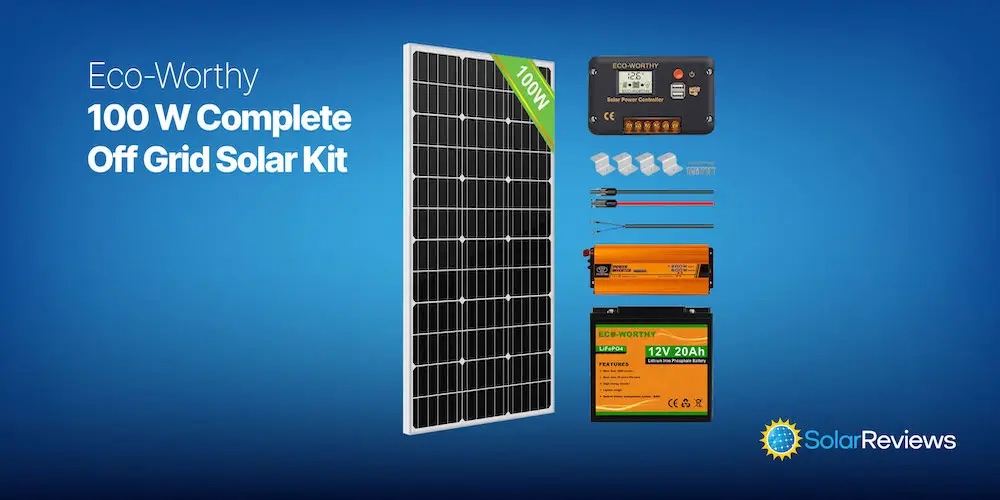
This 100 W starter kit from Eco-Worthy is a rare find: it's affordable and includes a panel, charge controller, power inverter, and even battery storage. This is a great option for a beginner looking to set up a small off-grid system.
What we like:
This is a complete 100 W solar panel kit. You can use it to build a fully-functional off-grid setup without the need for any additional components.
There are two battery options: A lightweight lithium battery with 240 watt-hours (Wh) of storage, or a bulkier AGM lead-acid with a 1,200 Wh capacity.
Great value for money.
What we don’t:
This isn't the best-looking equipment aesthetically speaking, but this is a matter of personal preference.
SunPower E-Flex 100W
Best: 100 W panel for RVs, boats, and other vehicles
Price: $152 Buy now on Express Power or eBay
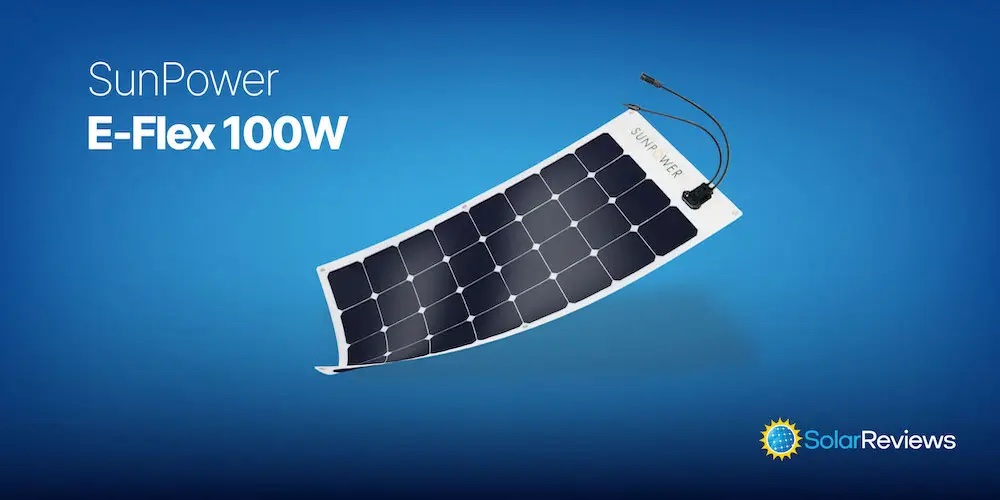
SunPower’s E-Flex series panels are made with special lightweight solar cells and covered with a thin polymer. They’re a great choice if you want to add some solar capacity to an RV, camper van, or boat.
What we like:
It's a SunPower panel! Founded in Silicon Valley, solar manufacturer SunPower (now rebranded as Maxeon Solar) is renowned for the exceptional quality, performance, and efficiency of its products.
While flexible solar panels generally offer subpar performance, this isn’t the case with the SunPower E-Flex. You'll see the panels are designed for excellent power output and are equipped to perform well in extreme temperatures.
It comes with pre-drilled holes for easy installation.
What we don’t:
Flexible solar panels aren't as durable as the standard glass-covered rigid solar panels you're used to seeing.
The product warranty on the SunPower E-Flex is short – only five years. That said, you can expect it to continue to perform well for many years after its warranty term.
It doesn’t come with a solar charge controller or battery bank – you’ll have to buy these separately.
Renogy 100 Watt Foldable Solar Suitcase
Best: Portable 100 W panel
Price: $186.99 Buy now on Renogy
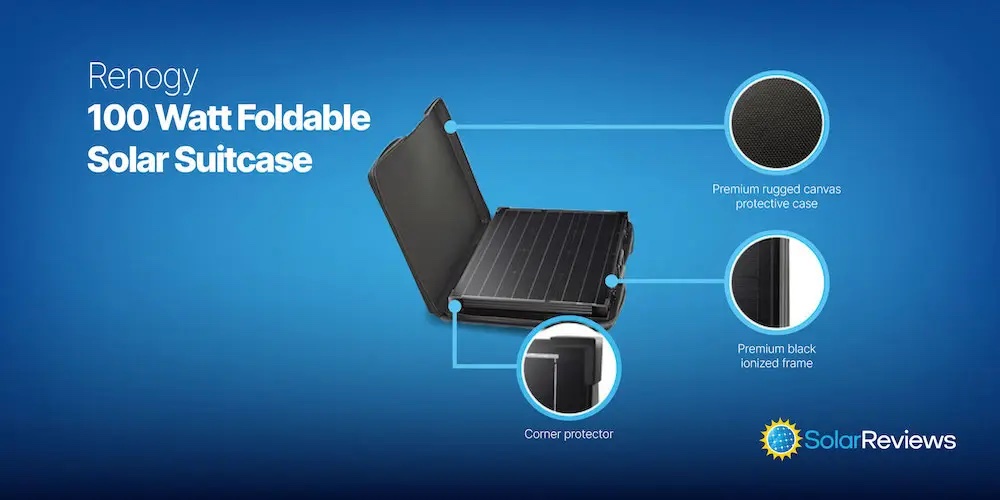
This 100 W Renogy folding solar panel kit delivers excellent performance in a highly portable package. Setup is a breeze, and when you’re done using it you can fold it, stick it in its case, and carry it like a briefcase. How cool is that?
What we like:
Renogy is arguably the best-known brand in the portable solar panel segment. It has built a strong reputation for producing high-quality products and providing excellent after-sales service.
The protective case allows you to pack and store it without worrying about damage to the solar cells.
Adjustable stands allow you to position your panel towards the sun at the optimal angle, boosting your power output.
What we don’t:
It’s heavy; the combined weight of the panel and case is 20.5 pounds.
Goal Zero Boulder 100
Best: 100 W panel for the rugged outdoors
Price: $249.95 Buy now on Goal Zero or Amazon
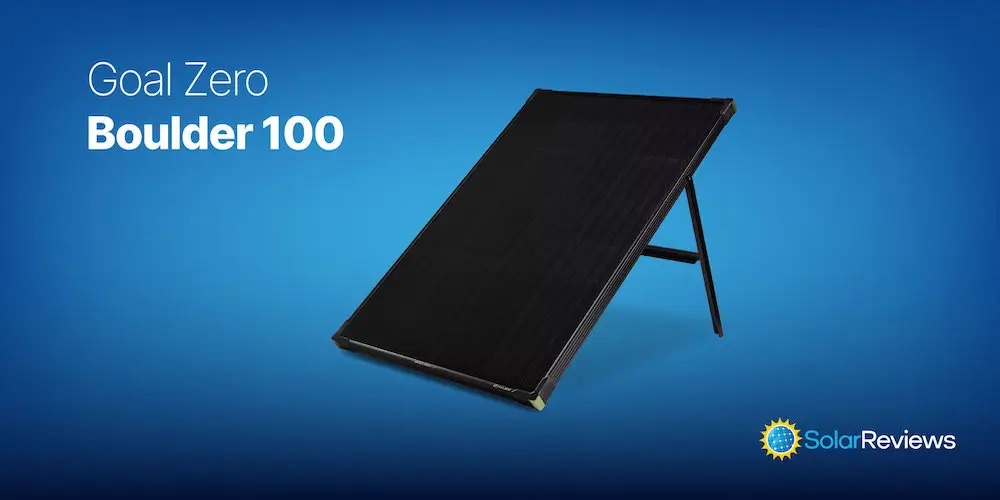
The Boulder 100 is a rigid, 18-22 volt monocrystalline solar panel. It’s designed to be a hardy companion to Goal Zero’s solar generators, which get a lot of love from the outdoorsy crowd because of their reliability and durability.
What we like:
It’s durable. This 100-watt monocrystalline solar panel is protected by a strong aluminum frame and comes with a sturdy kickstand. It looks like it can withstand some pretty rough conditions.
Easy to use. Put the Boulder 100 out in the sun and you’ve got a mini power station that can charge your Goal Zero’s Yeti and Sherpa solar generators – no additional setup or equipment required.
What we don’t:
Some users report that power output drops significantly under light cloud cover.
While portable, it’s still a bit cumbersome to move around.
The Boulder 100 is more expensive than other rigid panels offering similar output.
Top brands of 100 W solar panels
Renogy is the most established brand in the 100 W solar panel segment – you’ll see them mentioned in many ‘best-of’ lists.
But there are actually many solar manufacturing companies that specialize in small portable solar panels and kits. Here are some other reputable suppliers of 100 W panels worth considering:
Coleman
Eco-Worthy
ExpertPower
Goal Zero
Grape Solar
HQST
Newpowa
Richsolar
WindyNation
You can expect these brands to provide you with a high-quality solar panel that will function well for many years.
What can a 100 W kit run?
A 100 W panel connected to a deep cycle battery is ideal for running small devices like WiFi routers and smartphone chargers.
Here’s how long you can expect to run different devices with a 100 W solar panel kit.
Device(s) | Typical power usage | Run time |
|---|---|---|
Four smartphone chargers | 20 W | All day |
Three WiFi routers | 18 W | All day |
Two LED lights | 20 W | All day |
Ceiling fan | 35 W | 14 hours |
Laptop | 60 W | 8 hours |
*Assuming 500 watt-hours of usable energy
A single 100-watt panel will struggle to power larger devices, or many devices running at the same. Your battery will either fail to handle the load or run out of juice very quickly.
If you need more power, consider expanding your system’s capacity with additional 100 W panels, or upgrading to something more powerful like a solar generator.
What is the energy output of a 100 W panel?
In terms of instantaneous output, a 100 W panel may be able to hit its maximum power output of 100 Watts of DC power when it’s very sunny out, but the rest of the time output will likely be lower than that.
It’s more useful to measure solar panel output over time using watt-hours (Wh). Over a day, a 100 W panel typically generates between 300 Wh and 600 Wh.
Location and weather determine output
The average output of a 100-watt solar panel differs from place to place due to varying latitude and climate conditions.
Panels are able to generate the most energy in locations that receive lots of sunlight. In Arizona, for instance, you’ll consistently see excellent power output – an average of 750 Wh per day.
At the other end of the spectrum, there’s Alaska. There, the long months of winter darkness mean average output drops to just 280 Wh a day.
As you’d expect, the average output you’ll see in all other states will fall somewhere between these two extremes. Here’s a map that indicates the average daily power output of a 100 W solar panel in each state.
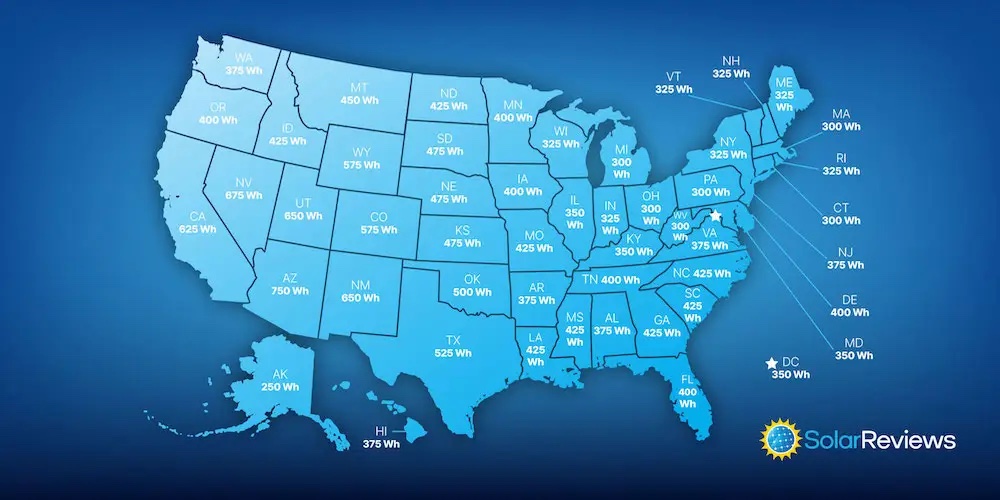
You’ll also want to account for the impact of weather.
A 100-watt panel can potentially generate 800 Wh or more on long sunny days with cool temperatures. But, production could drop as low as 50 to 100 Wh on very cloudy days.
Do I need a battery with my 100 W panel?
Pairing your 100 W solar panel with a battery is generally a good idea. Although it will add to your costs, a battery will help you make full use of your solar panel’s potential.
Here’s why. Solar panels tend to produce the bulk of their power around midday, and you might not be able to use all that power right then. Unlike a home solar panel system, a 100 W panel can’t export to the grid, which means unused power will simply go to waste. The solution is to add a battery pack that can store excess power, making it available for you to use later when you need it.
Lead-acid battery
Although bulky, lead-acid batteries are an affordable way to add storage to a 100 W panel. You should pair a single 100 W panel with a 12-volt lead-acid battery with a capacity of around 1,200 Wh. Make sure to factor in depth of discharge – you shouldn’t use more than 50% of the energy stored within most lead-acid batteries.
Lithium batteries
Lithium batteries are lighter and more efficient than their lead-acid cousins. Another point of difference is that they can be discharged almost completely. Aim for storage that is able to hold slightly more than your solar panel's typical daily output. An example of an appropriate lithium-ion battery is the Goal Zero Yeti 4; it has 396 watt-hours of storage capacity, so you should be able to fully charge it over a reasonably sunny day.
Can you power a home with 100 W solar panels?
You could if you wanted to, but it wouldn’t make financial sense.
Homes use a lot of energy, and they generally require a solar system sized between 5 kilowatts (kW) and 10 kW (that’s 5,000 to 10,000 W). You would need between 50 and 100 100-watt solar panels to make a solar system that size. It’s far more efficient and cost-effective to build a home solar panel system with residential solar panels that are 350 to 400 W each.
Can you connect multiple 100 W panels together?
Yes, you have the option of ‘chaining’ solar panels together to increase the total output.
For instance, connecting two 100 W panels together in series or parallel will give you up to 200 W of usable power.
It’s extremely common for solar panels to be connected. Many RVs have three or four 100 W panels connected together in their setups. Home solar panel systems use the same method to connect 10 to 20 residential panels together.
However, before adding additional panels to your setup you’ll first want to make sure that your inverter and battery (if you’re using one) can handle the extra power input.
Our verdict on 100 W solar panels
If you haven’t used renewable energy, a 100 Watt (W) solar panel is a great way to dip your toes in the proverbial water.
While they come in many shapes and sizes, every 100 W panel will provide you with small but useful amounts of solar power. They’re most effective when paired with a battery, as this lets you store energy for later use. They’re a great way to charge up phones and tablets when you’re away from a power outlet, like during a camping trip.
Just remember that a 100 W solar panel is only meant to power two or three small devices; it’s not the right choice if you’re looking to power your entire home. For that, you’ll need a system that has at least 5,000 W (5 kW) of capacity that is built with residential panels that are 350 W to 400 W each. Such a system can offset up to 100% of your electric usage while also charging up a solar battery like the Tesla Powerwall.
To find out the exact system size that’s right for your home, use our calculator below.
Zeeshan is a solar journalist who has long been passionate about climate issues and developed a deep interest in solar power after witnessing its successful adoption in Australia. He has previously worked as a journalist for a major news organization, covering energy, climate, and environmental stories, among other topics. He also served as an organizer for the Pakistan Youth Climate Network, an advocacy group aimed at raising climate awareness...
Learn more about Zeeshan Hyder